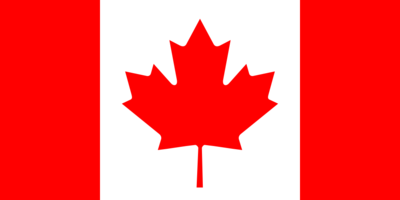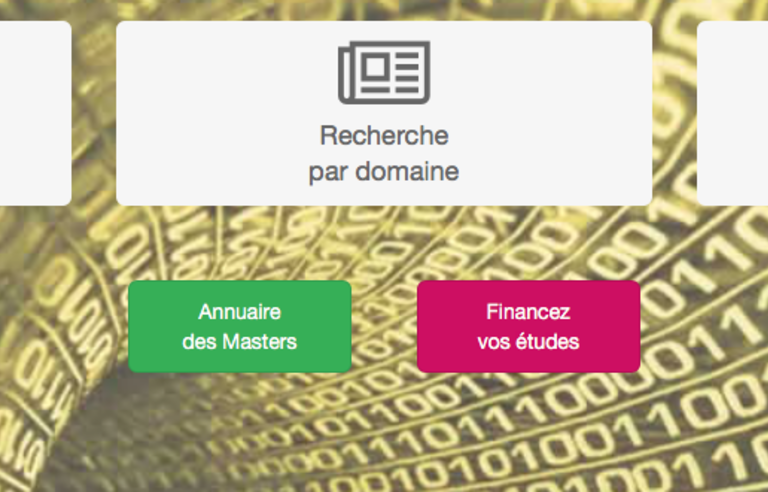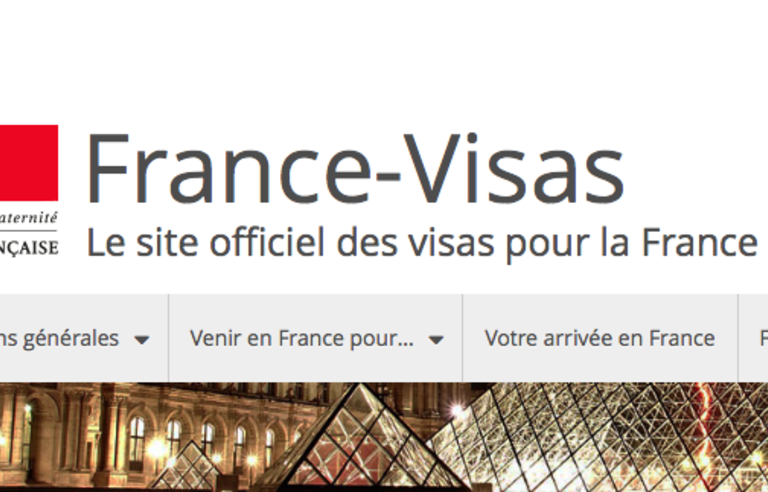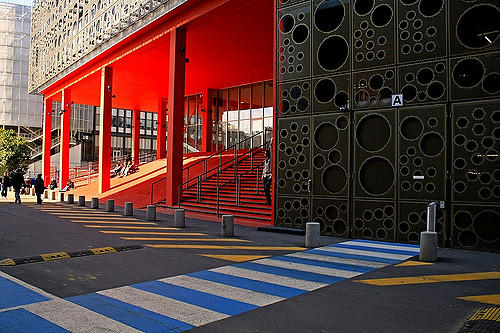In France there are more than 3,500 public and private institutes of higher education. Universities, Grandes Ecoles and schools of art or architecture: there is a wide choice for foreign students who want to study in France.
The universities: higher education for all
Universities receive 75% of the foreign students who choose France for their post-secondary education. These public institutes of higher education are financed by the French State. Located all around France, the universities confer national degrees (Bachelor's, Master's, Doctorate) that all have the same academic value.
Everyone who has a high school diploma or equivalent can enrol in first year. Science, literature, languages, arts, humanities, medicine and sport: university programmes cover all of the areas of learning and research.
The Grandes Ecoles: the French culture of excellence
20% of foreign students are enrolled in a programme in the Grandes Ecoles. Écoles Normales Supérieures (ENS - Institutes of Advanced Education), Instituts d’Etudes Politiques (IEP - Political Science Institutes), engineering schools, business and management schools, veterinary schools and a few others, these Grandes Ecoles are public and private institutes of higher education recognised by the French State. They confer degrees for 5 years of undergraduate studies, and some award the title of Master. Much of the training is provided in English (browse the Programs taught in English).
Admission to the Grandes Ecoles is very selective. It is based on a competitive entry exam after two years of preparatory classes, with an appropriate degree or directly after high school for schools that have an integrated preparatory programme. Tuition and fees are higher than for university.
Specialised schools and institutes: specific programmes
Nearly 3,000 public and private institutes of higher education offer courses in specific sectors such as healthcare, audio-visual, communication, journalism, fashion and design, agronomy, political science, etc.
These institutes confer degrees and certificates that may or may not be recognised by the State. Admission to these specialised schools and institutes is based on a competitive entry exam or the applicant's file. Studies there generally last two to five years.
Schools of art, applied arts and national schools of architecture
To discover the training programmes offered in schools of art and aplied arts as well as those offered by the national schools of architecture (ENSA), please consult the following page: Arts studies
French degrees, LMD system and equivalences
French higher education has adopted the LMD system. Most degrees that it awards also give ECTS credits that are recognised by many countries in the European Union and around the world.
Degrees standardised with the LMD reform and credits
The three-level organisation of post-secondary education is shared by most countries in the European Union; in France, it is called the licence-master-doctorat system (Bachelor's-Master's-Doctorate), or the LMD system.
This system standardises the levels and organises recognition of the degrees in the different countries. It makes educational mobility easier in Europe and elsewhere.
LMD degrees are obtained by successfully completing a certain number of semesters from the time of entry in the higher education system. Each semester awards up to 30 ECTS (European Credits Transfer System) credits that are valid in, and can be transferred to other countries.
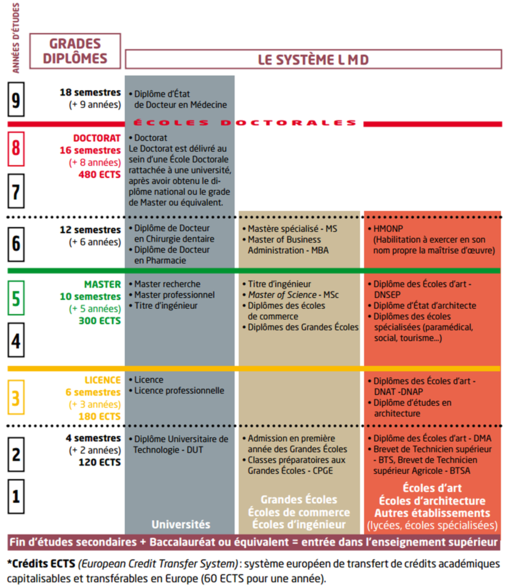
A Bachelor's (Licence) requires successful completion of six semesters, resulting in 180 ECTS credits. An additional four semesters are required to obtain a Master's, with an additional 120 ECTS credits. A Doctorate is awarded after successful completion of sixteen semesters and awards a total of 480 ECTS credits in a minimum of eight years of studies starting from the first year of the Bachelor's programme.
Degrees recognised and guaranteed by the French government
The value of a French higher education diploma is guaranteed by the State when it's a French diploma, a degree certified by the French Ministry of Education ("diplôme visé") or titles registered on the RNCP (French Directory of Professional Certifications).
For some "Grandes Ecoles" and business/engineering schools, the quality of training and diplomas may also be certified by independent organisations issuing accreditations or labels.
Equivalences between French and foreign degrees
Each establishment defines its own admission criteria, according to the student's background and the programme requirements. Only the host establishment is authorised to accept or refuse an applicant. Mutual agreements to recognise degrees may nonetheless make requests for equivalence easier.
The ENIC-NARIC centre may provide an attestation certifying to the French, the value of a degree obtained from a foreign educational system. This attestation does not constitute an equivalence in and of itself, but some institutes of higher education require it. The procedure costs 70 Euros per request.
The ENIC-NARIC European network also lets you certify the value for your country of the years you spent studying in France.
Certifying professional experience
There are several structures that certify professional experience with the aim of enrolling in training or certifying a degree, diploma or level of qualification.
There are two distinct procedures: VAP 85 and VAE. The first enables direct access to training following certification of past experience. The second awards all or part of a degree by certifying the applicant's skills and knowledge.
The applicant must submit a dossier to a jury. In practice, these structures are frequently used by French higher education institutes to determine the level of an applicant with respect to the requirements of the programmes they provide.


